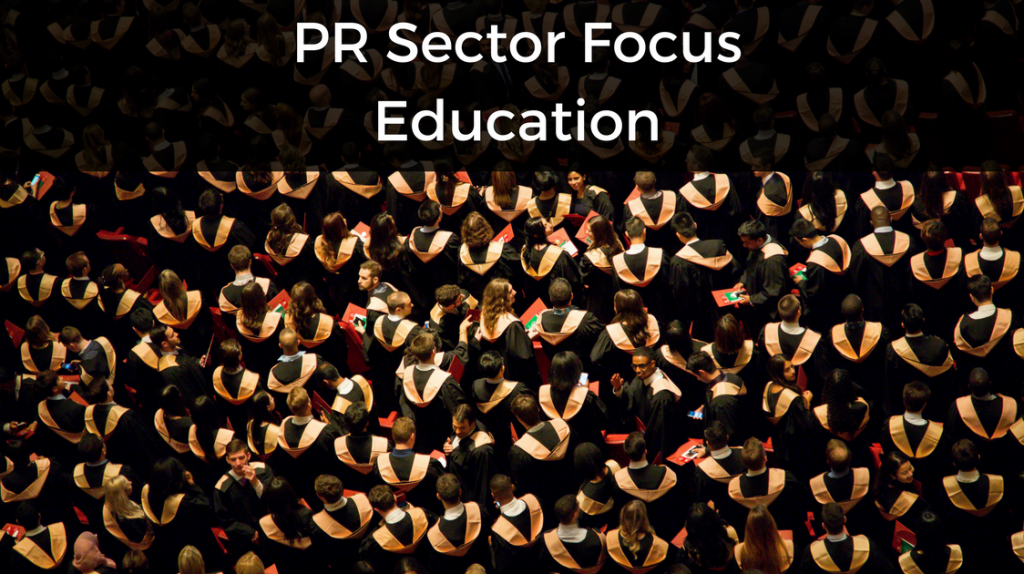PR Sector Focus: Education

This month we went back to school and spoke to PR professionals in the education sector to find out all about their industry.
- Hari Srinivasan, PR Manager, Global University Systems
- Ruth Sparkes, Director, EMPRA
- Darren Evans, Head of Content, Brighter Comms
- Niamh O’Grady, Head of Communications, FutureLearn
What is the best part of working in the education sector?
The sector is quite dynamic, making everyday a fresh experiment in its own right. Your primary audience – students and business – keeps evolving, so you will never see your workload stagnate. Despite the serious nature of the sector, barring a few perennial fixtures in the PR calendar, education public relations teams have the luxury of being very creative owing to that aforementioned dynamism. That creativity breeds enthusiasm, and makes for a great workplace environment.
Hari Srinivasan, Global University Systems
It’s a cliché, but education is so important, both for individuals and for society as a whole. People in lots of sectors talk about looking to the future, but education is actually helping to build the future.
As such it is always at the top of the national and local policy agenda and is a constant topic of discussion and debate.
Education is always changing, evolving and innovating, and that’s what makes working in the sector so exciting and ultimately so rewarding.
Darren Evans, Brighter Comms
It’s so varied and it changes all of the time. One minute you can be crisis managing and the next you can be writing up the most fabulous stories about triumph over tragedy, staff and students doing remarkable things. Then working with primary school children expressing wonder when they’ve experienced or learnt something for the very first time – quotes from primary school children are the best!
You end up doing all sorts – spending time in court on behalf of a client and the next day you could be escorting a photographer who’s taking pictures of 100s of pirates or mini Harry Potters because it’s World Book Day
Ruth Sparkes, EMPRA
Without doubt, the best thing about working in the education sector is feeling like you’re making a difference. It sounds cliche, but it’s a very nice feeling to be promoting courses and pathways into education that people didn’t know existed. By placing an article in the right kind of publication, someone who’s never done any formal study could be inspired to get started, or someone else might find exactly the right course that’s going to get them the professional development qualification they need to get that promotion or pay rise.
Niamh O’Grady, FutureLearn

What are the difficulties?
You need to be able to think on your feet. It’s a vibrant sector, and the ability to adapt at great speed is a must. The PR team at Global University Systems (GUS), on any given day, deals with sectors as diverse as trading and fashion to law and accountancy, all of which are taught in our network of institutions. Whilst the common thread of ‘education’ binds them all, you need to have a finger on the pulse of everything within that spectrum of sectors. You need to be an information junkie. That can be quite challenging if you don’t come into work every day mentally prepared to learn a lot, quickly – and this can be hard work.
Hari Srinivasan, Global University Systems
Unlike other sectors education is something almost everyone has experienced at some point in their life – everyone has been to school or has been taught in some way.
That also means everyone has an opinion – on the curriculum, on teaching methods and on associated things such as discipline.
Unfortunately the debate and therefore the policy direction can become dictated to by emotion, rather than fact, and that can make it difficult to have your voice heard.
Darren Evans, Brighter Comms
When we first take on a client (if it’s a school) we try to spend time explaining how the media works, and how we have to engage. The difference between puffery and real interest, and what a deadline really means.
There are certain times of the year when certain stories are more newsworthy than others so we try to take advantage of that and work with the schools to prepare.
Schools obviously need to protect their pupils, and sometimes we can’t use pictures that we’ve taken because the school hasn’t got the permission it thought it had, or we can’t use full names (this can impact on press coverage) – some staff object to taking pictures because of the risks around child protection.
There can be lots of frustrations. And there is a marked difference between that way state schools operate and independent schools. Independent schools have to operate as a business, it’s a difficult market for them – so they have a better grasp of presentation in everything.
For example… in the state sector everything seems as if it’s done on a shoestring, so sometimes photography is really poor, for example, the PE teacher might take an ‘action’ shot with their phone – it’ll be out of focus, with bits chopped off and they will expect us to do something with it.
Ruth Sparkes, EMPRA
Budget, or more accurately, lack of budget. I’m ex-agency with a technology background and was lucky enough to have amazing budgets to bring journalists on pretty fantastic press trips in the past. When it comes to the education sector, those budgets just don’t exist – and perhaps they shouldn’t – but it makes things a challenge sometimes. We have to be creative about angles that are going to work and quick to respond to opportunities in order to secure coverage.
Niamh O’Grady, FutureLearn
Which campaign has been your favourite to create?
On the PR front, data is a much better way of fronting stories than wordy press release. At one of our institutions, London School of Business and Finance (LSBF), we pioneered a ‘Careers Report’ campaign that generated a lot of media buzz. We explored several topics within the report across the UK – career satisfaction, desire for career change, etc. Two years since the announcement, the report continues to generate the occasional press coverage till this very day.
Hari Srinivasan, Global University Systems
I’m particularly proud of our work to boost the profile of Aspire 2Be, a leading education technology company based in Swansea.
One of the most exciting campaigns we worked on with them was their project to digitise the history of Port Talbot steelworks, a major employer in South West Wales with an uncertain future.
Seeing pupils using the latest technology to bring history to life and record the personal testimonies of those who spent their life in this industry was truly inspiring.
We were particularly pleased that the story was picked up by BBC Wales.
Darren Evans, Brighter Comms
The awareness campaign for Future Mag ( a careers, education and lifestyle magazine for 14-19s distributed through schools) – We’ve had coverage from SKY News, The Mirror and The star to The Sun’s SnapChat channel (twice). We planned the start of the campaign to co-inside with exam results days in August crafting topical stories from the cost of going to university and 10 top jobs that don’t need a degree to coping with your first day at 6th Form.
As an avid local newspaper fan we produced copy that spanned local and regional coverage in England, Wales and Northern Ireland – coverage.
Ruth Sparkes, EMPRA
Perhaps not a campaign in the truest sense but earlier this year, we announced our first university partners in the US and despite no PR agency in the US (or the UK) and doing everything, including spokesperson interviews from the UK, we managed to secure key interviews with US education correspondents which resulted in the most comprehensive coverage we’ve ever had in the US – an important market for us as it’s where our main competitors are based.
Niamh O’Grady, FutureLearn
Is there are piece of press coverage you are extra proud to have achieved?
At the end of day, student outcomes are as important as goals can get within education. At GUS, we take pride in our institutions’ commitment to delivering excellence to students. That endeavour was recognised by students last year as one of our institutions – The University of Law (ULaw) – was ranked top in the UK for student satisfaction in the National Student Survey 2016. Taking this announcement to the press was quite satisfying.
Hari Srinivasan, Global University Systems
Although gaining national newspaper coverage is always an achievement, often the most important pieces of coverage are those that showcase your client in their target publications, those that are most read by their industry peers.
To that end we’re proud to have had our education clients featured prominently in titles including the TES and Education Technology.
(That said I’m also proud to have gained Daily Telegraph coverage for Aspire 2Be.)
Darren Evans, Brighter Comms
Recently I was most excited to get Future Mag on the Sun’s Snapchat channel twice – that’s where its reading audience is.
Ruth Sparkes, EMPRA
The US coverage was fantastic; there was a real feeling of accomplishment with that. But my personal favourite was the coverage from interviews with Sir Vince Cable. He was the lead educator on a University of Nottingham course on The Politics of Economics and the Economics of Politicians and we were lucky to get some of his time to chat face-to-face to the BBC and THE. Of course, Sir Vince was able to relate the content of the course to politics at the time which made for great reading.
Niamh O’Grady, FutureLearn
How do you decide which stories to cover?
When chalking out strategies to kick-start specific campaigns, I try to focus on what we seek to communicate to our audience. This means being aware of what is business critical, and aligning PR initiatives as closely as possible with our marketing, social media and SEO activities. Being an international organisation, knowing how to synchronise activities across different markets, time zones and languages, is key. As a department, we always prioritise press outreach based on business requirements.
Hari Srinivasan, Global University Systems
The stories we cover depend very much on the individual client and the nature of their business.
In Wales education policy is devolved and there have been lots of changes in a relatively short space of time; there is currently much discussion over the introduction of a new national curriculum for example.
This means we have plenty of opportunity for our clients to provide expert comment and analysis.
Darren Evans, Brighter Comms
You have to work out the news value, the point of the story and your client’s needs as opposed to their wants. Sometimes it’s about pointing out a really great story that otherwise would have gone unnoticed, sometimes it’s about managing expectations, sometimes it’s about highlighting dangers and getting clients to understand the risks and sometimes it’s about working and doing your absolute best with what you’ve got.
Ruth Sparkes, EMPRA
We’re a team of two and we have 1,000 courses on the platform this year from almost 100 different universities in over 20 countries. Suffice to say, we simply can’t PR them all. It’s about finding the ones that are topical, that we can tie into the news agenda, and it’s also about working with our partners to get great content from the academics leading these online courses. Then there’s the wider brand stories like what we’re doing with the British Council’s Study UK campaign, which we’re incredibly proud of. There’s definitely a balance to be struck between course promotion and wider brand awareness work, and of course, all of the above comes with a side of stakeholder management, both internally and with partners.
Niamh O’Grady, FutureLearn









